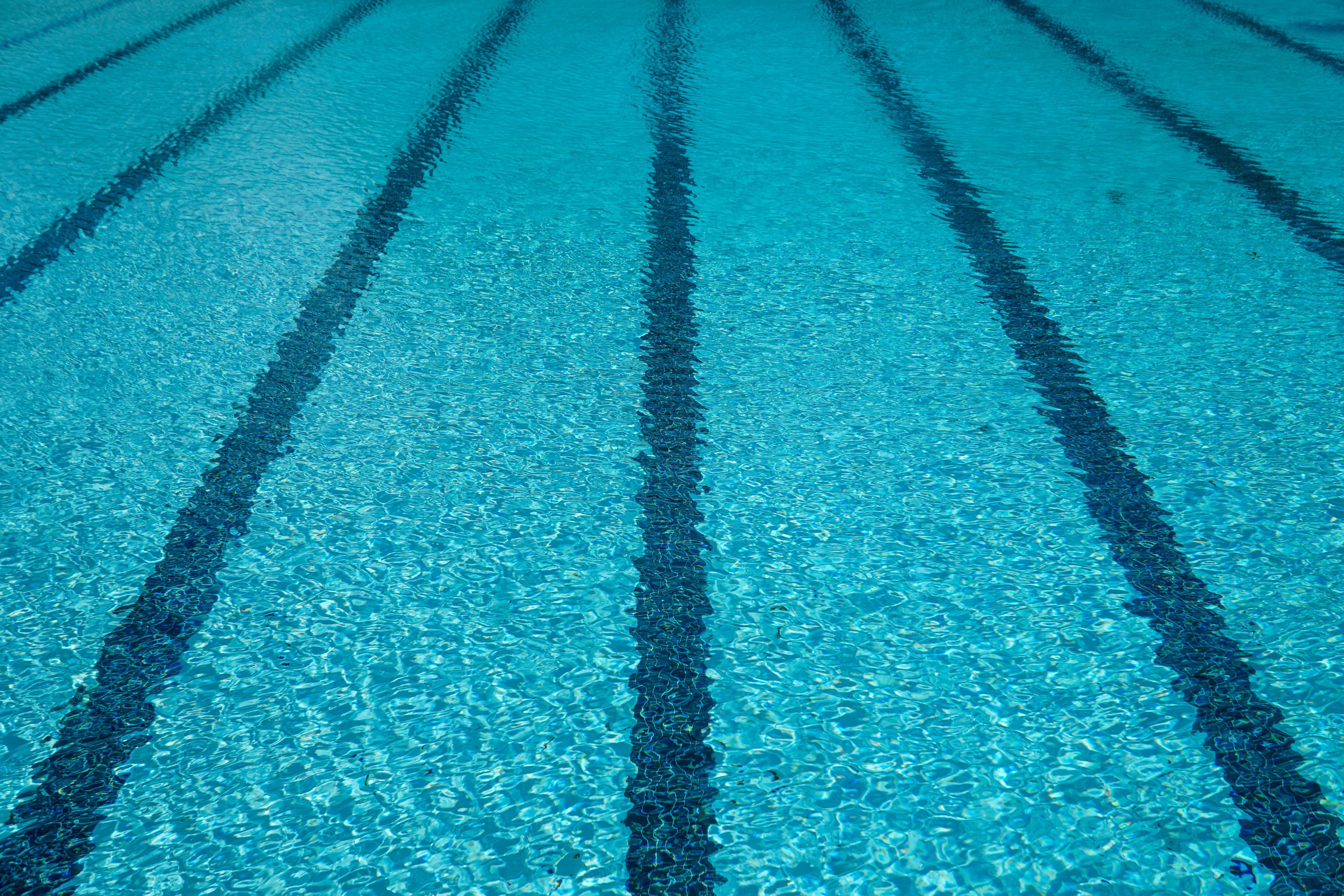By Abdul Seraaj
Edited by Shay Stinson and Intisar Seraaj
“On September 16, 2019, I was asked to give a parental testimony in front of the Montgomery (Alabama) YMCA Metro Board of Directors about how swimming has impacted the life of my son Rasheed Seraaj. I’d like to share my testimony.
Rasheed is a year-round competitive swimmer for the Montgomery East YCMA Barracuda Swim Team. While growing up, Rasheed had several issues with asthma which at times affected his focus. As a child, having a known medical condition and being what some “experts” may have labeled as different, was difficult at times. His mother and I decided that we wanted to build Rasheed’s confidence and overall wellness by using physically therapeutic activities like sports. We know our child has lots of energy, and we believe he only needed age-appropriate, healthy outlets to burn energy and ways to learn how to manage any potential health concerns as a child. We decided to find sports that would serve as an alternative to his being put on random medications for things that he may have eventually outgrown as a child.
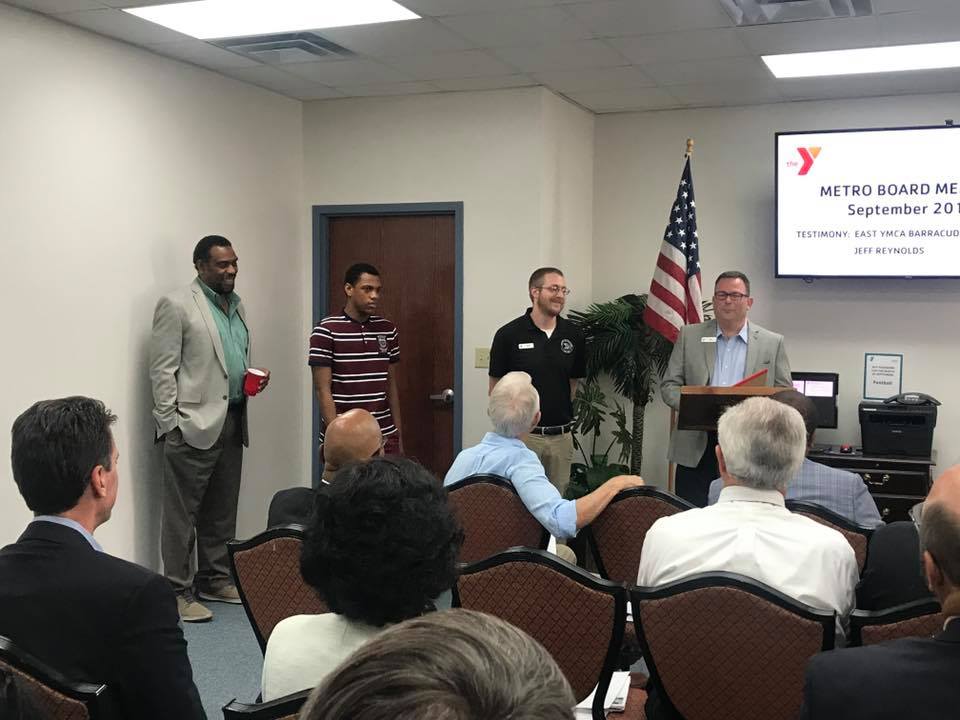
Abdul Seraaj (far left) and son Rasheed Seraaj (2nd from left) prepare to give a testimony and speech to the Montgomery YMCA Board of Directors Meeting on the Impact of Swimming on Rasheed’s life.
Swimming became a favorite activity for Rasheed and an outlet for stress, a form of exercise, and a great confidence booster for his overall health. The new focus Rasheed gained transferred to his academic studies. He’s an honor roll student. He’s winning academic and swimming awards. Swimming has also significantly improved his physical appearance, which has increased his self-esteem. He’s become more considerate about his overall personal appearance. He feels good about himself and he associates it with his work ethic in the swimming pool.
Rasheed has become more confident, competitive in athletics and academics, and fearless of taking risks. He is more goal-oriented and focused on what he wants to achieve in life. Swimming has also helped him to develop a group of respectable friends on his swimming team and at school. He even won several academic achievement awards at his school Success Unlimited Academy, including the Outstanding Leadership Award for the 2018-2019 academic school year, and was recognized as an outstanding honor roll student.
The rigorous swimming practice schedule has led Rasheed to develop the discipline it takes to succeed throughout life. One must be disciplined and dedicated, maintain healthy eating habits, and be focused to be a competitive swimmer. Rasheed attends swimming practices six days a week and practices twice daily at least 2 to 3 times per week, often during weekdays. He wakes up at 4:30 a.m. to be at practice by 5 a.m. and gets out at 6:30 a.m. Then he must shower, get dressed, eat breakfast, and be at school by 8:15 a.m. Afterwards, he goes back to practice from 4 p.m. to 6 p.m. Twice a week this practice lasts until 7 p.m. He’s balancing all these practices with his academic studies, eating nutritious meals, and getting adequate sleep.
Being an Advocate –
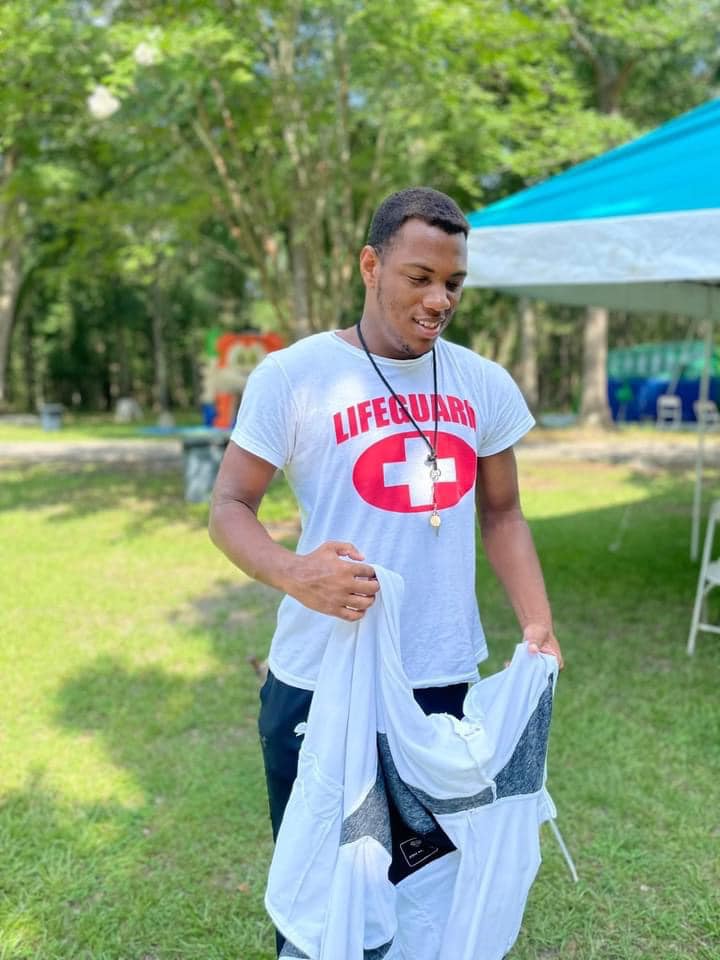
Rasheed is a part-time resident lifeguard at The Grandma Home House Retreat. Part of his duties includes water safety for special needs children and youth with physical disabilities.
As a parent, the challenge is making sure your child maintains a balanced life. We help Rasheed stay focused and with time management, so he doesn’t become overwhelmed with swimming. Our task is to make sure he also engages in normal, family, and age-appropriate activities such as attending religious services, participating in family holiday events, associating with extended family members, and attending social events with his peers. In addition, we’re focused on exposing our child to other social, cultural, and sporting events, encouraging him to be well-rounded by exposing him to a diverse range of activities. And sometimes we must tell him, “No, it’s time to give yourself a break from swimming. Just relax and allow your body and mind to heal.”
In all that Rasheed has accomplished on a personal level as a competitive swimmer, it is his impact on the African American community that will probably have the most lasting impression. Traditionally in close-knit African American families, you will discover very few individuals who swim on leisure or competitive level. Swimming has historically been an activity that was off-limits or out of reach for African American enjoyment. Black children like Rasheed that can attain access to swimming as an activity and develop it as a passion, have the power to change preceding generational stereotypes and fear.
The CDC has identified the need for basic swimming skills as a preventative measure for the growing amount of drowning-related deaths amongst African Americans and Indian or Native Americans. Children like Rasheed who can influence their peers through positive reinforcement will effect change in these statistics. As swimming-related activities become more accessible to underprivileged communities, there must be programs ready and prepared to properly educate and train novice swimmers on safety and preventive measures.
The formula here is simple, train a child to face a fear they have, and you will change a generation behind him. We used swimming to introduce a positive energy outlet for Rasheed and he used swimming to develop himself as a competitive athlete and academic. He saved himself from drowning in a sea of statistics. The chances are great that once properly introduced and trained, others like Rasheed would follow suit and we’ll start to see a change in the statistics.
I would be remiss not to quote the American author Marianne Williamson:
“Our deepest fear is not that we are inadequate. Our deepest fear is that we are powerful beyond measure. It is our light, not our darkness that most frightens us. We ask ourselves, ‘Who am I to be brilliant, gorgeous, talented, fabulous?’ Actually, who are you not to be? You are a child of God. Your playing small does not serve the world. There is nothing enlightened about shrinking so that other people won’t feel insecure around you. We are all meant to shine, as children do. We were born to make manifest the glory of God that is within us. It’s not just in some of us; it’s in everyone. And as we let our own light shine, we unconsciously give other people permission to do the same. As we are liberated from our own fear, our presence automatically liberates others.”
Swimming has indeed positively changed Rasheed’s life, giving him confidence in multiple aspects of life. So too can be the result for us that are traditionally engrained to not face the fears that stifle us.” – Abdul Seraaj, CEO and father
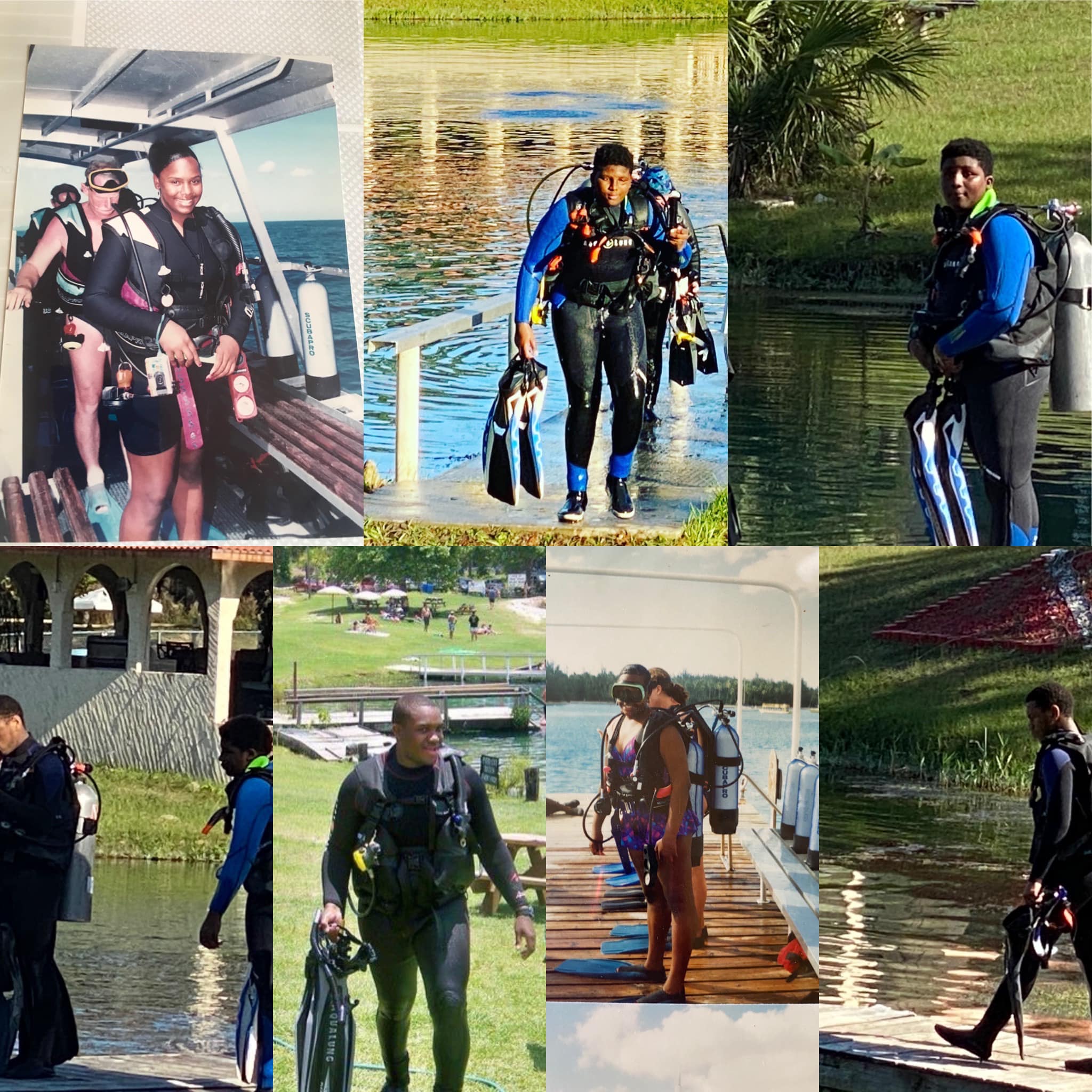
Youth can benefit from the confidence gained in swimming and excel in other aquatic sports like scuba diving.
Swimming and The Community –
Abdul Seraaj knows more about the benefits of swimming than just what he’s seen with his own son. As the CEO of Seraaj Family Homes, Inc. Therapeutic Foster Care Agency, Seraaj has witnessed the benefits of swim programs as a form of therapy for children in foster care with behavioral needs such as ADHD or children on the autism spectrum.
Using swim as a form of therapy can greatly benefit children who need to learn confidence, patience, and stress management, or have an outlet for exercise and wellness. Foster youth are at a higher risk of drowning and injury in water due to the low availability of water safety lessons, swim lessons, and unstable living conditions throughout childhood.
Programs like the Africantown Swim Program in Africatown (Plateau), Alabama are setting out to change these statistics. This water safety program is a partnership with Mobile County Parks and Recreation Department and The African Town Heritage Preservation Foundation that aims to teach children how to swim. This 6-week swim program will introduce participants ages 5+ to the basics of swimming and give them the skills to become strong, confident swimmers.
Most local communities offer swim lessons that will get your little ones ready for water activities. The key is to start early and be intentional about water safety considering all the benefits of a swim program. One of the swim instructors of the Africatown Swim Program was quoted telling his parents in orientation to never scare children by threatening them that they will drown. Instead, ensure them that they can gain the confidence to swim and keep themselves safe in the water.
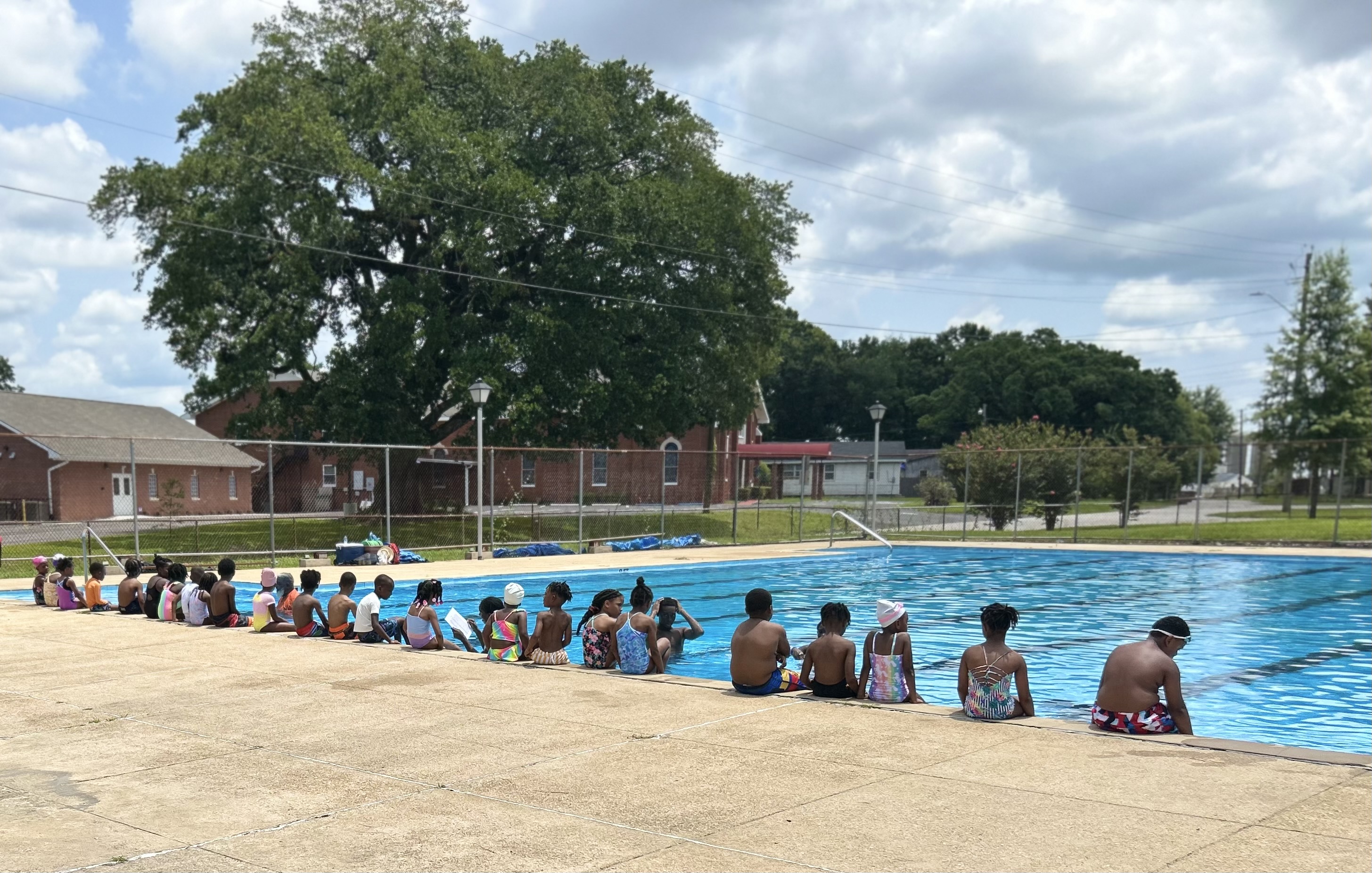
Roughly 30 eager swimmers lined the pool at Kidd Park in the Africatown Community on a hot summer’s day to begin their 5-7-year-old session for swim safety lessons sponsored by the Africa Town Historic Preservation Foundation.

